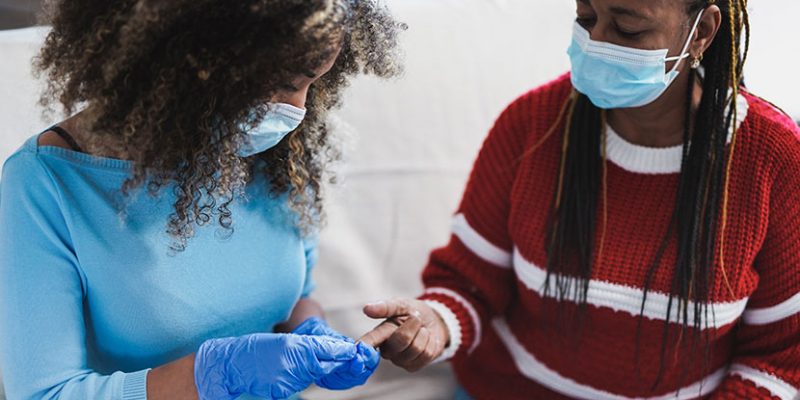A Pandemic Is No Time To Ignore Diabetes Care
Written By: Susanne Medeiros for the American Academy of Ophthalmology on December 21, 2020.
People with diabetes who catch COVID-19 are more likely than others to develop severe illness and die. There are no easy answers as to why. But we do know that the best defense against severe COVID-19 is good diabetes management. That means controlling your blood sugar through diet and exercise, going to regular physician visits and taking medications as prescribed.
The data are startling. A Lancet Diabetes & Endocrinology study showed that the risk of dying from COVID-19 was almost three times higher for people with type 1 diabetes and almost twice as high for type 2, compared with people without diabetes. Data from the U.S. Centers for Disease Control and Prevention (CDC) show that among people younger than 65 who died from coronavirus, about half had diabetes.
Prevention is the best plan of action for people with diabetes
The plan starts with following their primary doctor’s care plan for managing their diabetes and maintaining healthy blood glucose levels. Eating a healthy diet and getting regular exercise, and not smoking are critical lifestyle choices for well-managed diabetes.
As important are yearly visits to the ophthalmologist. Comprehensive eye exams are crucial to early detection of vision-threatening complications such as diabetic retinopathy. You can have diabetic retinopathy and not know it. This is because it often has no symptoms in its early stages. If unchecked and untreated, eye conditions such as diabetic retinopathy, cataracts or glaucoma can worsen, resulting in serious consequences such as blindness.
Concerned about visiting your ophthalmologist’s office during the pandemic?
Ophthalmologists have devised new office procedures to protect their patients and staff from COVID-19. Read more about the many ways they’ve made it safe to come to the office. If you have questions or concerns, give your ophthalmologist a call. Your ophthalmologist is guided by what’s best for you.
Follow the CDC’s advice on how to protect yourself and others from COVID-19
- Wash your hands often. Use soap and water for at least 20 seconds especially after you have been in a public place, or after blowing your nose, coughing, or sneezing.
- Avoid close contact. Inside your home: Avoid close contact with people who are sick. Outside your home: Put 6 feet of distance between yourself and people who don’t live in your household. Remember that some people without symptoms may be able to spread virus.
- Mask up. Cover your mouth and nose with a mask when around others. Masks help prevent you from getting or spreading the virus. Follow our tips to prevent your mask from fogging up your glasses.
- Clean and disinfect. Clean frequently touched surfaces daily. This includes tables, doorknobs, light switches, countertops, handles, desks, phones, keyboards, toilets, faucets, and sinks.
- Monitor your health daily. Be alert for symptoms. Watch for fever, cough, shortness of breath, or other symptoms of COVID-19.
- Get a flu shot. While getting a flu vaccine will not protect against COVID-19 there are many important benefits, including reducing the risk of flu illness, hospitalization, and death. Also, saving healthcare resources for the care of patients with COVID-19.

